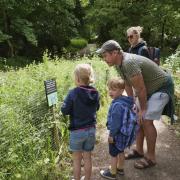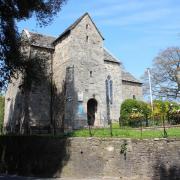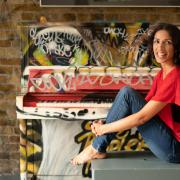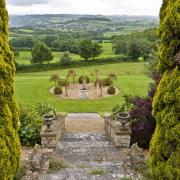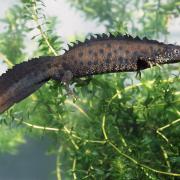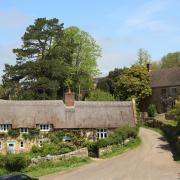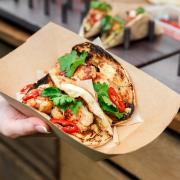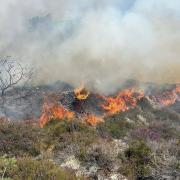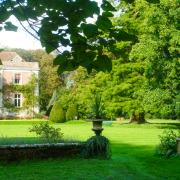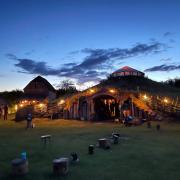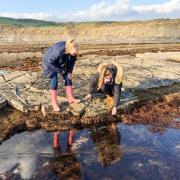Poole has always been proud of its rebellious roots. With Scaplen’s Court a garrison for Parliamentarians during the Civil War, the smugglers’ ghosts who haunt the pubs of the Old Town, and our pirate governor Harry Paye, we have a long history of making a stand for the freedom of the people of Poole.
It can be difficult to uncover the clandestine histories of smugglers. So, too, is it a struggle to unearth queer histories due to the need for secrecy under punitive laws throughout the centuries. This is even more the case in smaller towns that may not have had quite so many well-known ‘mollies’ and ‘urnings’ as London or other capital cities.
As David, a local drag performer known as Venezuela D’Viña, notes: ‘It doesn’t matter where you come from, there can be LGBT people. But they were invisibilised, often dying on their own and they had to fake their lives.’

Even now, 55 years after the Stonewall Riots, Poole is about to hold its first Pride event. This can be partly explained by the success of Bourne Free, Bournemouth’s well-attended Pride, now in its 20th year (July 5-6). However, while a rainbow flag may be flown above our High Street during June, there is rarely any further sign of the acceptance and welcome in Poole that the LGBTQ+ community finds in neighbouring Bournemouth.
Morgan Wodring, a PhD student who grew up in Poole, acknowledges how damaging the lack of LGBTQ+ visibility can be. ‘I didn’t even realise I was LGBTQ+ until I started talking to people on the internet. I never knew there were words for my feelings… I was subjected to a fair amount of homophobic bullying.’
They recall one intimidating incident where a lesbian couple at their school were harshly disciplined just for holding hands in the hallways. Rosie Baker, a local artist from the same school, says: ‘Outside of school was even worse because you'd get adults picking on you for not following strict gender rules.’

Elisha, a local dancer and performer, expresses the fear she experienced coming out after suffering homophobic bullying before she had even realised her sexuality. ‘If that happened to me when I didn't have feelings towards girls, what's going to happen to me now that I’m bisexual?’
David’s experiences, having moved to Poole later in life, have been mixed. ‘In the BCP (Bournemouth Christchurch and Poole) area you have a creative, outgoing vibe that is very open-minded, but at the same time feels very rough… I don’t really feel safe, and friends of mine have been attacked.’ He tries to see the positive side, however, and while he acknowledges he would prefer to feel safe enough to prepare for shows at home, David enjoys being well known for carrying a toolbox full of makeup.
It can be difficult for LGBTQ+ people in Poole to know where to find each other, this is due to the lack of visible representation and recognisable safe spaces. And for LGBTQ+ people who do not or cannot drink, it’s even harder to meet other members of their community.
‘If you asked me where to go to meet queer people as an adult in Poole, I’d have no idea where to suggest,’ says Cara, who has lived in Poole most of her life. Having aged out of the Space Youth Project, which provides an invaluable safe space for young LGBTQ+ people, Cara and her partner Luke, who moved here from Brighton, even tried reaching out on queer friend-finding app Lex.

‘I posted to the local area like “hey does anyone know of any non-nightclub LGBT venues?” and I got no responses,’ says Luke. ‘Instead, I got private messages saying, “if you do find out let me know”. It’s clearly something people want and need.’
In Elisha’s experience, the few times she has felt fully connected to the local LGBTQ+ community have been at Bourne Free. ‘Even if the only thing we had in common was this one thing, it still brought us together. It was just community. It didn’t matter who you were, you were safe.’
For Morgan, Pride is the chance to feel normal rather than an outlier. ‘It means a lot for us to be able to go somewhere and be the norm,’ they reflect. ‘Pride is a place where the majority of people there are queer, and those who aren’t are accepting. It’s a feeling of community which can be hard to come by.’
Pride is also a chance to connect to a support network. ‘There are groups with stands at Bournemouth Pride, without this I would have no other way of finding out that they exist,’ explains Cara. ‘Suddenly you find out about all these people, and you realise it’s not just you and this little isolated island of the five individuals that you know.’
For Luke, Pride is a rare chance to not be self-conscious. ‘It’s like the one day where if someone does realise I’m trans, it’s fine. To know there are other people around who aren’t in your sphere but still in the community… Well, it’s just nice for that visibility, and it makes me feel more confident in a passive way.’ He adds that after attending Pride that feeling of safety and community resonates throughout the year.

When you hear the name ‘Pride’ you may think of the larger events such as those held in London or Brighton. However, it is just as important in smaller towns, possibly even more so, as Morgan explains. ‘London Pride attracts people from all over the country. But the smaller local Pride events shows that there’s a queer community on your doorstep. So, you know you’re not alone.’
Having Pride events in smaller towns also enables those who may not be able to travel to engage with their community in spaces they can access more easily, says Luke. ‘It leaves space for disabled queer folk to join in, which is very important to me personally.’
Elisha echoes this sentiment, as her anxiety can make it difficult to engage with large crowds. ‘With the small, community events it’s nicer because you meet people closer to home so you can actually make genuine friendships and connections in your area.’

David makes the point that regardless of how close Bournemouth might be to Poole, people should feel welcome in their own hometown. ‘Some of these people have to get themselves to bigger cities just to feel like they can be themselves for a day and that’s heartbreaking.’
Regarding Poole Pride specifically, Elisha says: ‘To have something in Poole where I’ve got so many unpleasant memories of people yelling at me down the street… It would be nice for me to rewrite some of those memories with a new sense of community.’
Rosie agrees and believes that Poole has the potential to embrace a more inclusive attitude. ‘I would expect less difficulty walking down the street holding a girl’s hand than I would have 10 years ago, but we are not safe yet. I have no doubt that hosting Pride in Poole will make people like me feel more accepted, as well as physically safe out in public.’

As LGBTQ+ people, we so often live dampened lives, in fear of the response from those around us, particularly given the current wave of vitriol toward transgender and gender-nonconforming people led by big names like J K Rowling.
Like Morgan, Rosie, Elisha, David, Luke and Cara, I’ve experienced harassment and violence as a transgender person throughout my life. While Pride is of course a vibrant celebration of our differences, it has always been a protest in the face of adversity, and a chance to connect visibly and vocally with our wider local community. In a time that mirrors so closely the damaging years of Section 28, where the lives of gender diverse people are used as fodder for a one-sided culture war, being a part of the Poole people’s traditional staunchness against injustice is both an honour and a delight.
Poole’s first Pride, taking place on Saturday June 8 at Lighthouse Poole, is an all-day extravaganza of local queer talent, including a unique exhibition celebrating John Chesterman and the history of Pride, with a rollicking party in the evening. For me and many other local LGBTQ+ people and allies, this is an exciting and hope-filled chance to celebrate with all of Poole, celebrating how much stronger we are for our diversity.
As David (Venezuela D’Viña) so eloquently puts it: ‘I don’t believe in building walls but establishing bridges that bring us close to one another. That’s what we’re meant to do as a society. This goes beyond Pride, beyond the LGBT community, just as a human being.’

What’s on at Poole Pride
Poole Pride, on June 8, features a day of free performances and activities at Lighthouse Poole which culminates in a ticketed live concert and after-show party headlined by drag superstar Bimini (RuPaul’s Drag Race UK) and queer DJ collective Horse Meat Disco. By day, CBeebies star Chris Jarvis hosts a family talent show in the outdoor theatre before the Proud Pooches dog show. In the Concert Hall, Pop’n’Olly host a crafting session, and the Sherling Studio hosts Life’s A Cabaret: Outspoken Slam, Dorsetborn’s Writing Out Loud and the Come On Out Cabaret showcasing local LGBTQ+ artists. Lighthouse is also hosting a queer film festival in the week leading up to Poole Pride. Their art exhibition We Didn’t Know if It Was a Party or A Revolution (May 24 – June 16) honours influential gay activist John Chesterman. Find more details and buy tickets at lighthousepoole.co.uk




